2025年中考英语语法精讲精练系列-名词性从句课件(共45张PPT)
文档属性
| 名称 | 2025年中考英语语法精讲精练系列-名词性从句课件(共45张PPT) |  | |
| 格式 | pptx | ||
| 文件大小 | 59.6MB | ||
| 资源类型 | 教案 | ||
| 版本资源 | 通用版 | ||
| 科目 | 英语 | ||
| 更新时间 | 2024-12-07 21:43:32 | ||
图片预览


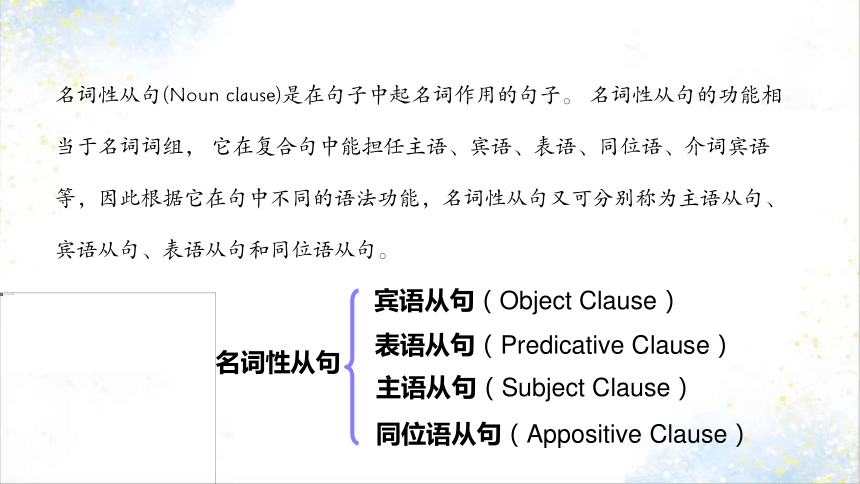

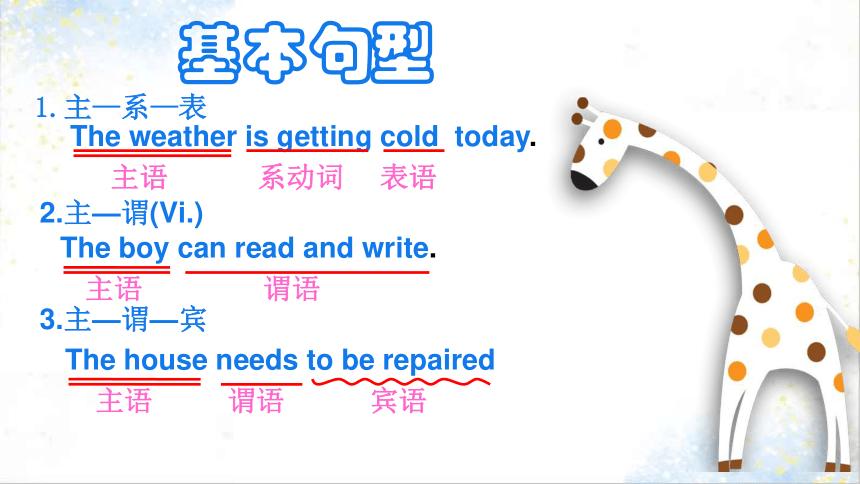
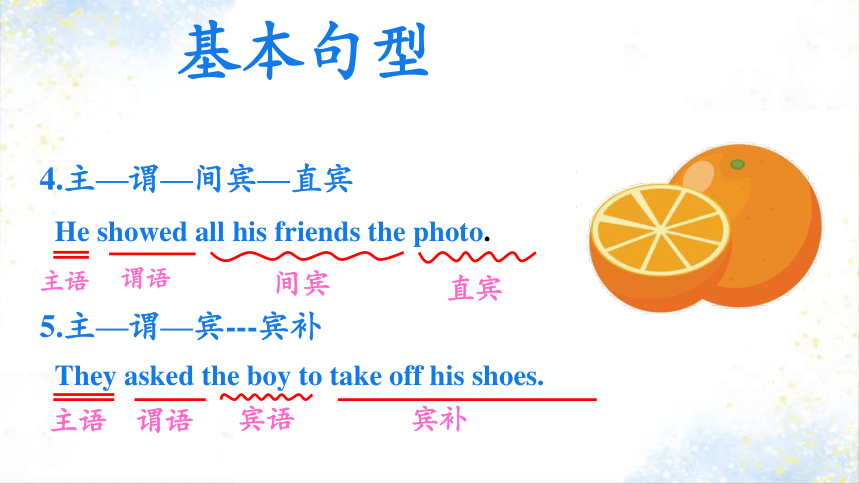


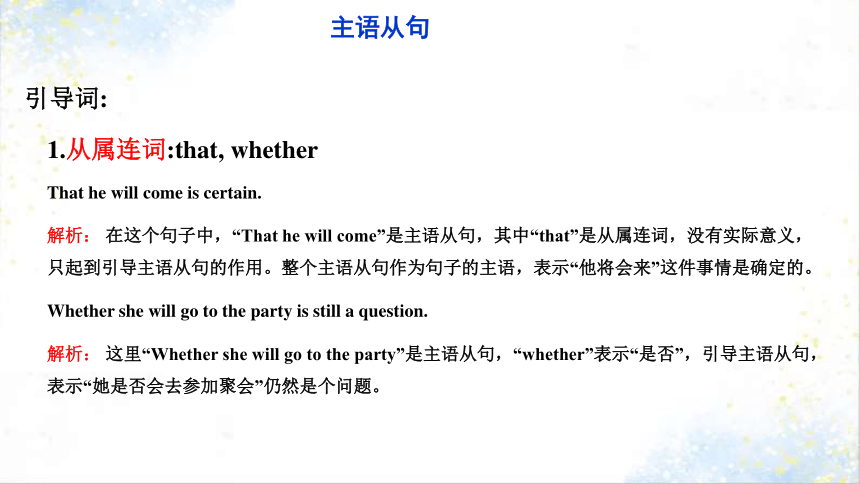
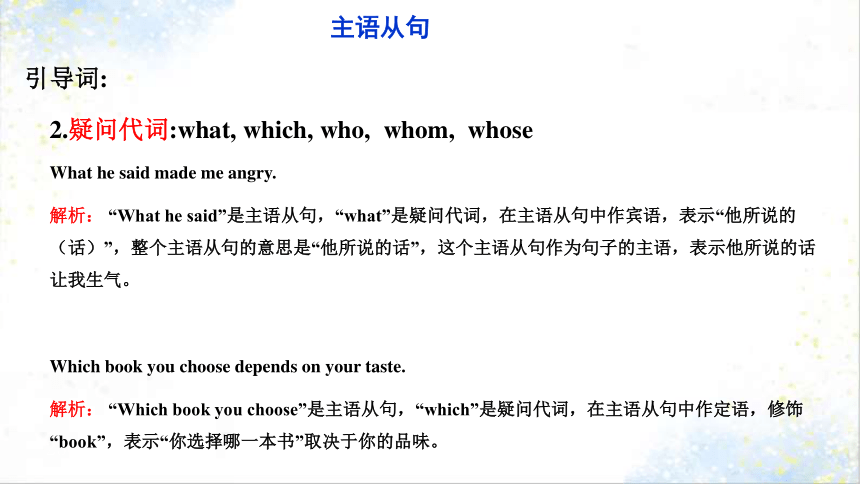

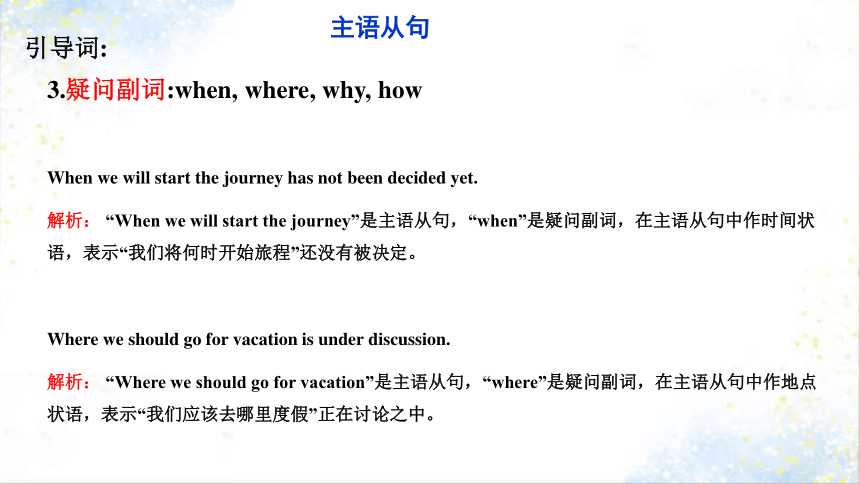
文档简介
(共45张PPT)
中考英语语法
精讲精练系列
名词性从句
名词性从句的定义
名词性从句(Noun clause)是在句子中起名词作用的句子。 名词性从句的功能相当于名词词组, 它在复合句中能担任主语、宾语、表语、同位语、介词宾语等,因此根据它在句中不同的语法功能,名词性从句又可分别称为主语从句、宾语从句、表语从句和同位语从句。
名词性从句
宾语从句(Object Clause)
表语从句(Predicative Clause)
主语从句(Subject Clause)
同位语从句(Appositive Clause)
基本句型
基本句型
1.主—系—表
The weather is getting cold today.
主语
系动词
表语
2.主—谓(Vi.)
The boy can read and write.
主语
谓语
3.主—谓—宾
The house needs to be repaired
主语
谓语
宾语
基本句型
4.主—谓—间宾—直宾
He showed all his friends the photo.
主语
谓语
间宾
直宾
5.主—谓—宾---宾补
They asked the boy to take off his shoes.
主语
谓语
宾语
宾补
主语从句
英语主语从句 是指在复合句中充当主语成分的句子。主语从句通常由一个完整的句子构成,并且可以在复合句中担任主语的角色。
主语
主—系—表
主—谓
主—谓—宾
主—谓—间宾—直宾
主—谓—宾—宾补
+ 谓语 + 宾语
主语从句
引导词:
1.从属连词:that, whether
That he will come is certain.
解析: 在这个句子中,“That he will come”是主语从句,其中“that”是从属连词,没有实际意义,只起到引导主语从句的作用。整个主语从句作为句子的主语,表示“他将会来”这件事情是确定的。
Whether she will go to the party is still a question.
解析: 这里“Whether she will go to the party”是主语从句,“whether”表示“是否”,引导主语从句,表示“她是否会去参加聚会”仍然是个问题。
主语从句
引导词:
2.疑问代词:what, which, who, whom, whose
What he said made me angry.
解析: “What he said”是主语从句,“what”是疑问代词,在主语从句中作宾语,表示“他所说的(话)”,整个主语从句的意思是“他所说的话”,这个主语从句作为句子的主语,表示他所说的话让我生气。
Which book you choose depends on your taste.
解析: “Which book you choose”是主语从句,“which”是疑问代词,在主语从句中作定语,修饰“book”,表示“你选择哪一本书”取决于你的品味。
主语从句
引导词:
Who will be the winner is hard to predict.
解析: “Who will be the winner”是主语从句,“who”是疑问代词,在主语从句中作主语,表示“谁将会成为获胜者”很难预测。
Whom we should invite to the meeting is a problem.
解析: “Whom we should invite to the meeting”是主语从句,“whom”是疑问代词,在主语从句中作宾语,表示“我们应该邀请谁来参加会议”是个问题。
Whose book this is remains a mystery.
解析: “Whose book this is”是主语从句,“whose”是疑问代词,在主语从句中作定语,表示“这是谁的书”仍然是个谜。
主语从句
引导词:
3.疑问副词:when, where, why, how
When we will start the journey has not been decided yet.
解析: “When we will start the journey”是主语从句,“when”是疑问副词,在主语从句中作时间状语,表示“我们将何时开始旅程”还没有被决定。
Where we should go for vacation is under discussion.
解析: “Where we should go for vacation”是主语从句,“where”是疑问副词,在主语从句中作地点状语,表示“我们应该去哪里度假”正在讨论之中。
主语从句
引导词:
Why he left so early is still unknown.
解析: “Why he left so early”是主语从句,“why”是疑问副词,在主语从句中作原因状语,表示“他为什么这么早离开”仍然是未知的。
How we can solve this problem needs to be considered.
解析: “How we can solve this problem”是主语从句,“how”是疑问副词,在主语从句中作方式状语,表示“我们如何能解决这个问题”需要被考虑。
主语从句
引导词:
4.复合关系代词:whatever, whichever, whoever, whomever
Whatever you do is your own choice.
解析: “Whatever you do”是主语从句,“whatever”是复合关系代词,在主语从句中作宾语,表示“无论你做什么”都是你自己的选择。
Whichever team wins will get a big prize.
解析: “Whichever team wins”是主语从句,“whichever”是复合关系代词,在主语从句中作定语,修饰“team”,表示“无论哪个队获胜”都将得到一个大奖。
主语从句
引导词:
Whoever comes first will get the chance.
解析: “Whoever comes first”是主语从句,“whoever”是复合关系代词,在主语从句中作主语,表示“无论谁先来”都将得到这个机会。
Whomever you like can be your partner.
解析: “Whomever you like”是主语从句,“whomever”是复合关系代词,在主语从句中作宾语,表示“无论你喜欢谁”都可以成为你的伙伴。
宾语从句
主语 + 谓语 + 宾语
主—系—表
主—谓
主—谓—宾
主—谓—间宾—直宾
主—谓—宾—宾补
在主从复合句中充当宾语,位于及物动词、介词或复合谓语之后的从句称为宾语从句。
引导词:
1.从属连词:that, whether, if
I believe that he is honest.
解析: 在这个句子中,“that he is honest”是宾语从句,“that”是从属连词,没有实际意义,只起到连接主句和宾语从句的作用。主句是“I believe”,宾语从句表示“他是诚实的”这个陈述内容。
I don't know whether he will come.
解析: 这里“whether he will come”是宾语从句,“whether”表示“是否”,连接主句“I don't know”和宾语从句,表示“我不知道他是否会来”。
She asked me if I had seen her book.
解析: “if I had seen her book”是宾语从句,“if”连接主句“She asked me”和宾语从句,表示“她问我是否看到过她的书”。
引导词:
2.疑问代词:what, which, who, whom, whose
He doesn't know what I want.
解析: “what I want”是宾语从句,“what”是疑问代词,在宾语从句中作宾语,表示“他不知道我想要什么”。
I wonder which book she will choose.
解析: “which book she will choose”是宾语从句,“which”是疑问代词,在宾语从句中作定语,修饰“book”,表示“我想知道她将会选择哪一本书”。
引导词:
2.疑问代词:what, which, who, whom, whose
They don't know who will teach them English.
解析: “who will teach them English”是宾语从句,“who”是疑问代词,在宾语从句中作主语,表示“他们不知道谁将教他们英语”。
I don't know whom he is waiting for.
解析: “whom he is waiting for”是宾语从句,“whom”是疑问代词,在宾语从句中作宾语,表示“我不知道他正在等谁”。
She asked whose pen this was.
解析: “whose pen this was”是宾语从句,“whose”是疑问代词,在宾语从句中作定语,表示“她问这是谁的钢笔”。
引导词:
3.疑问副词:when, where, why, how
I wonder when he will arrive.
解析: “when he will arrive”是宾语从句,“when”是疑问副词,在宾语从句中作时间状语,表示“我想知道他什么时候将会到达”。
He doesn't know where she lives.
解析: “where she lives”是宾语从句,“where”是疑问副词,在宾语从句中作地点状语,表示“他不知道她住在哪里”。
I don't understand why he left so early.
解析: “why he left so early”是宾语从句,“why”是疑问副词,在宾语从句中作原因状语,表示“我不理解他为什么这么早离开”。
引导词:
4.复合关系代词:whatever, whoever, whichever, whomever
She wants to know how I solved the problem.
解析: “how I solved the problem”是宾语从句,“how”是疑问副词,在宾语从句中作方式状语,表示“她想知道我是如何解决这个问题的”。
You can choose whatever you like.
解析: “whatever you like”是宾语从句,“whatever”是复合关系代词,在宾语从句中作宾语,表示“你可以选择任何你喜欢的东西”。
引导词:
4.复合关系代词:whatever, whoever, whichever, whomever
We will invite whoever comes first.
解析: “whoever comes first”是宾语从句,“whoever”是复合关系代词,在宾语从句中作主语,表示“我们将邀请第一个来的人”。
Take whichever seat you want.
解析: “whichever seat you want”是宾语从句,“whichever”是复合关系代词,在宾语从句中作定语,修饰“seat”,表示“你可以坐任何你想要坐的座位”。
He will talk to whomever he meets.
解析: “whomever he meets”是宾语从句,“whomever”是复合关系代词,在宾语从句中作宾语,表示“他将和他遇到的任何人交谈”。
同位语从句
同位语从句
1.概念:
在复合句中作___________的同位语的名词性从句。
2.功能:
同位语从句对该抽象名词进行解释,说明名词的具体内容
3.用法: 常跟同位语从句的抽象名词有:
fact_____/ idea_____ /reason _____ /thought_____
/doubt_____/news_____/hope______/belief_______
/message______/decision ______ / warning_____
/information______ order_______ / promise______
/ possibility_______ /evidence_____ ……
事实
想法
理由
想法
疑惑
消息
希望
信念
消息
决定
警告
信息
命令
诺言
可能性
证据
抽象名词
4.连词: that/whether/who/ which/what/when/where/why/how
The news that we won the game made us excited.
解析: 在这个句子中,“The news”是中心词,“that we won the game”是同位语从句。“that”是引导同位语从句的连词,在从句中不充当任何成分,只起连接作用。同位语从句“we won the game”对“the news”的内容进行解释说明,即“我们赢得比赛”这个消息。
The question whether we should go there has not been decided yet.
解析: 这里“the question”是中心词,“whether we should go there”是同位语从句。“whether”表示“是否”,引导同位语从句对“the question”的内容进行解释,即“我们是否应该去那里”这个问题还没有被决定。
4.连词: that/whether/who/ which/what/when/where/why/how
The problem who will be in charge of this project needs to be solved.
解析: “The problem”是中心词,“who will be in charge of this project”是同位语从句。“who”在同位语从句中作主语,对“the problem”的内容进行解释,即“谁将负责这个项目”这个问题需要被解决。
I have no idea which method is more effective.
解析: “I have no idea”中的“idea”是中心词,“which method is more effective”是同位语从句。“which”在同位语从句中作定语,修饰“method”,这个同位语从句对“idea”的内容进行解释,即“我不清楚哪种方法更有效”。
I have no information what he will do next.
解析: “I have no information”中的“information”是中心词,“what he will do next”是同位语从句。“what”在同位语从句中作宾语,这个同位语从句对“information”的内容进行解释,即“我不知道他接下来会做什么”。
4.连词: that/whether/who/ which/what/when/where/why/how
We have no idea when he will come back.
解析: “We have no idea”中的“idea”是中心词,“when he will come back”是同位语从句。“when”在同位语从句中作时间状语,对“idea”的内容进行解释,即“我们不知道他什么时候会回来”。
The question where we should have the meeting is still under discussion.
解析: “The question”是中心词,“where we should have the meeting”是同位语从句。“where”在同位语从句中作地点状语,这个同位语从句对“question”的内容进行解释,即“我们应该在哪里开会”这个问题仍在讨论中。
4.连词: that/whether/who/ which/what/when/where/why/how
The reason why he was late is that he missed the bus.
解析: “The reason”是中心词,“why he was late”是同位语从句。“why”在同位语从句中作原因状语,对“reason”的内容进行解释,即“他迟到的原因是他错过了公交车”。
I have no clue how he managed to finish the work so quickly.
解析: “I have no clue”中的“clue”是中心词,“how he managed to finish the work so quickly”是同位语从句。“how”在同位语从句中作方式状语,这个同位语从句对“clue”的内容进行解释,即“我不清楚他是如何这么快完成这项工作的”。
表语从句
表语从句的构成
主语 + 系动词 + 引导词 + 简单句
This is why he did it.
表语从句放在连系动词之后,充当复合句中的表语。
What I want to say is that I am tired
连接词
that / whether /as if /as though (if不引导表语从句)
The fact is that he has passed the exam.
解析: 在这个句子中,“The fact”是主语,“is”是系动词,“that he has passed the exam”是表语从句。“that”作为引导词,在从句中不充当任何成分,没有实际意义,只是起到连接主句和表语从句的作用。表语从句“he has passed the exam”对主语“The fact”进行解释说明,表明事实就是他已经通过了考试。
The question is whether we can get there on time.
解析: 这里,“The question”是主语,“is”是系动词,“whether we can get there on time”是表语从句。“whether”表示“是否”,在表语从句中引导句子,表示问题在于我们是否能按时到达那里。
①从属连词
连接词
that / whether /as if /as though (if不引导表语从句)
It looks as if it is going to rain.
解析: 在这个句子中,“It”是主语,“looks”是系动词,“as if it is going to rain”是表语从句。“as if”的意思是“好像,似乎”,引导表语从句,表语从句“it is going to rain”描述看起来的状况,即好像要下雨了。
He talks as though he knew everything.
解析: “He”是主语,“talks”是系动词,“as though he knew everything”是表语从句。“as though”也表示“好像,似乎”,引导表语从句,这里表语从句“he knew everything”描述他说话时给人的感觉,好像他什么都知道。
①从属连词
连接词
who / whom / whose / which / what
The problem is who can solve this difficult math problem.
解析: 在这个句子中,“The problem”是主语,“is”是系动词,“who can solve this difficult math problem”是表语从句。“who”在表语从句中作主语,表示“谁能够解决这个困难的数学问题”,这个表语从句对主语“the problem”进行解释说明。
The question is whom we should invite to the party.
解析: 这里,“The question”是主语,“is”是系动词,“whom we should invite to the party”是表语从句。“whom”在表语从句中作宾语,表示“我们应该邀请谁来参加聚会”,这个表语从句解释说明主语“the question”的内容。
②连接代词
连接词
The mystery is whose book this is.
解析: “The mystery”是主语,“is”是系动词,“whose book this is”是表语从句。“whose”在表语从句中作定语,修饰“book”,表示“这是谁的书”,该表语从句用来解释主语“the mystery”。
The trouble is which way we should choose.
解析: “The trouble”是主语,“is”是系动词,“which way we should choose”是表语从句。“which”在表语从句中作定语,修饰“way”,表示“我们应该选择哪条路”,表语从句对主语“the trouble”进行解释。
That's what I want.
解析: “That”是主语,“is”是系动词,“what I want”是表语从句。“what”在表语从句中作宾语,表示“那就是我想要的(东西)”,表语从句用来解释主语“That”的具体内容。
②连接代词
连接词
③连接副词
when / where / why / how / because
The question is when we will start the project.
解析: 在这个句子中,“The question”是主语,“is”是系动词,“when we will start the project”是表语从句。“when”在表语从句中作时间状语,表示“我们将何时开始这个项目”,该表语从句是对主语“the question”内容的解释说明。
My problem is where I can find a good restaurant.
解析: “My problem”是主语,“is”是系动词,“where I can find a good restaurant”是表语从句。“where”在表语从句中作地点状语,表示“我在哪里能找到一家好餐馆”,用来解释主语“my problem”的具体内容。
连接词
③连接副词
The reason is why he left so early.
解析: 这里,“The reason”是主语,“is”是系动词,“why he left so early”是表语从句。“why”在表语从句中作原因状语,表示“他为什么这么早离开”,表语从句对主语“the reason”进行解释。
The key is how we can improve our English.
解析: “The key”是主语,“is”是系动词,“how we can improve our English”是表语从句。“how”在表语从句中作方式状语,表示“我们如何提高我们的英语(水平)”,这个表语从句解释主语“the key”的含义。
It is because I like reading that I often go to the library.
解析: 在这个强调句结构(It is... that...)中,“because I like reading”是表语从句。“because”引导表语从句,表示原因,这里强调的是“因为我喜欢阅读所以我经常去图书馆”这一因果关系。
课堂小结
种类 作用 常用关联词 例句
主语从 句 在复合句中做主语,相当于名 词,一般置谓语之前,也可用 it作形式主语,主语从句放主 句之后 that, whether, if, as if, as though, who, whose, which, how, when, where, why, what, whatever, whoever, wherever Whether he will come or not doesn't matter much. Whoever comes here will be welcome.
表语从 句 在复合句中做表语,相当于名 词,位于系动词之后 It looks as if it is going to snow.
宾语从 句 在复合句中做宾语,相当于名 词 He asked me which team could win the game.
同位语 从句 放在名词之后(news, problem, idea, suggestion, advice, thought, hope, fact等)表明其 具体内容 You have no idea how worried we are. The fact that he lied again greatly surprised us.
________ he will come or not doesn't matter much.
A. If
B. Whoever
C. Whether
D. Which
答案:C。
解析:根据表格中关于主语从句的描述,主语从句在复合句中做主语,相当于名词,常用关联词包括 whether。在这个句子中,需要一个关联词来引导主语从句,因此应该选择 whether。
It looks as if it ________ going to snow.
A. is
B. was
C. were
D. be
答案:A。
解析: 根据表格中关于表语从句的描述,表语从句在复合句中做表语,位于系动词之后,常用关联词包括 as if。在这个句子中,as if 引导的从句表示“看起来好像”,因此应该使用陈述语气的现在时态。
He asked me ________ team could win the game.
A. who
B. whose
C. which
D. whom
答案:C。
解析:根据表格中关于宾语从句的描述,宾语从句在复合句中做宾语,相当于名词,常用关联词包括 which。在这个句子中,需要一个关联词来引导宾语从句,并且从句中的 team 是物,因此应该选择 which。
You have no idea ________ worried we are.
A. how
B. what
C. why
D. that
答案:A。
解析:根据表格中关于同位语从句的描述,同位语从句放在名词之后表明其具体内容,常用关联词包括 how。在这个句子中,需要一个关联词来引导同位语从句,表示“我们有多担心”,因此应该选择 how。
The fact ________ he lied again greatly surprised us.
A. that
B. what
C. which
D. when
答案:A。
解析:根据表格中关于同位语从句的描述,同位语从句放在名词之后表明其具体内容,常用关联词包括 that。在这个句子中,fact 后面的从句是用来说明 fact 的具体内容,因此应该使用 that 作为关联词。
Thanks!
中考英语语法
精讲精练系列
名词性从句
名词性从句的定义
名词性从句(Noun clause)是在句子中起名词作用的句子。 名词性从句的功能相当于名词词组, 它在复合句中能担任主语、宾语、表语、同位语、介词宾语等,因此根据它在句中不同的语法功能,名词性从句又可分别称为主语从句、宾语从句、表语从句和同位语从句。
名词性从句
宾语从句(Object Clause)
表语从句(Predicative Clause)
主语从句(Subject Clause)
同位语从句(Appositive Clause)
基本句型
基本句型
1.主—系—表
The weather is getting cold today.
主语
系动词
表语
2.主—谓(Vi.)
The boy can read and write.
主语
谓语
3.主—谓—宾
The house needs to be repaired
主语
谓语
宾语
基本句型
4.主—谓—间宾—直宾
He showed all his friends the photo.
主语
谓语
间宾
直宾
5.主—谓—宾---宾补
They asked the boy to take off his shoes.
主语
谓语
宾语
宾补
主语从句
英语主语从句 是指在复合句中充当主语成分的句子。主语从句通常由一个完整的句子构成,并且可以在复合句中担任主语的角色。
主语
主—系—表
主—谓
主—谓—宾
主—谓—间宾—直宾
主—谓—宾—宾补
+ 谓语 + 宾语
主语从句
引导词:
1.从属连词:that, whether
That he will come is certain.
解析: 在这个句子中,“That he will come”是主语从句,其中“that”是从属连词,没有实际意义,只起到引导主语从句的作用。整个主语从句作为句子的主语,表示“他将会来”这件事情是确定的。
Whether she will go to the party is still a question.
解析: 这里“Whether she will go to the party”是主语从句,“whether”表示“是否”,引导主语从句,表示“她是否会去参加聚会”仍然是个问题。
主语从句
引导词:
2.疑问代词:what, which, who, whom, whose
What he said made me angry.
解析: “What he said”是主语从句,“what”是疑问代词,在主语从句中作宾语,表示“他所说的(话)”,整个主语从句的意思是“他所说的话”,这个主语从句作为句子的主语,表示他所说的话让我生气。
Which book you choose depends on your taste.
解析: “Which book you choose”是主语从句,“which”是疑问代词,在主语从句中作定语,修饰“book”,表示“你选择哪一本书”取决于你的品味。
主语从句
引导词:
Who will be the winner is hard to predict.
解析: “Who will be the winner”是主语从句,“who”是疑问代词,在主语从句中作主语,表示“谁将会成为获胜者”很难预测。
Whom we should invite to the meeting is a problem.
解析: “Whom we should invite to the meeting”是主语从句,“whom”是疑问代词,在主语从句中作宾语,表示“我们应该邀请谁来参加会议”是个问题。
Whose book this is remains a mystery.
解析: “Whose book this is”是主语从句,“whose”是疑问代词,在主语从句中作定语,表示“这是谁的书”仍然是个谜。
主语从句
引导词:
3.疑问副词:when, where, why, how
When we will start the journey has not been decided yet.
解析: “When we will start the journey”是主语从句,“when”是疑问副词,在主语从句中作时间状语,表示“我们将何时开始旅程”还没有被决定。
Where we should go for vacation is under discussion.
解析: “Where we should go for vacation”是主语从句,“where”是疑问副词,在主语从句中作地点状语,表示“我们应该去哪里度假”正在讨论之中。
主语从句
引导词:
Why he left so early is still unknown.
解析: “Why he left so early”是主语从句,“why”是疑问副词,在主语从句中作原因状语,表示“他为什么这么早离开”仍然是未知的。
How we can solve this problem needs to be considered.
解析: “How we can solve this problem”是主语从句,“how”是疑问副词,在主语从句中作方式状语,表示“我们如何能解决这个问题”需要被考虑。
主语从句
引导词:
4.复合关系代词:whatever, whichever, whoever, whomever
Whatever you do is your own choice.
解析: “Whatever you do”是主语从句,“whatever”是复合关系代词,在主语从句中作宾语,表示“无论你做什么”都是你自己的选择。
Whichever team wins will get a big prize.
解析: “Whichever team wins”是主语从句,“whichever”是复合关系代词,在主语从句中作定语,修饰“team”,表示“无论哪个队获胜”都将得到一个大奖。
主语从句
引导词:
Whoever comes first will get the chance.
解析: “Whoever comes first”是主语从句,“whoever”是复合关系代词,在主语从句中作主语,表示“无论谁先来”都将得到这个机会。
Whomever you like can be your partner.
解析: “Whomever you like”是主语从句,“whomever”是复合关系代词,在主语从句中作宾语,表示“无论你喜欢谁”都可以成为你的伙伴。
宾语从句
主语 + 谓语 + 宾语
主—系—表
主—谓
主—谓—宾
主—谓—间宾—直宾
主—谓—宾—宾补
在主从复合句中充当宾语,位于及物动词、介词或复合谓语之后的从句称为宾语从句。
引导词:
1.从属连词:that, whether, if
I believe that he is honest.
解析: 在这个句子中,“that he is honest”是宾语从句,“that”是从属连词,没有实际意义,只起到连接主句和宾语从句的作用。主句是“I believe”,宾语从句表示“他是诚实的”这个陈述内容。
I don't know whether he will come.
解析: 这里“whether he will come”是宾语从句,“whether”表示“是否”,连接主句“I don't know”和宾语从句,表示“我不知道他是否会来”。
She asked me if I had seen her book.
解析: “if I had seen her book”是宾语从句,“if”连接主句“She asked me”和宾语从句,表示“她问我是否看到过她的书”。
引导词:
2.疑问代词:what, which, who, whom, whose
He doesn't know what I want.
解析: “what I want”是宾语从句,“what”是疑问代词,在宾语从句中作宾语,表示“他不知道我想要什么”。
I wonder which book she will choose.
解析: “which book she will choose”是宾语从句,“which”是疑问代词,在宾语从句中作定语,修饰“book”,表示“我想知道她将会选择哪一本书”。
引导词:
2.疑问代词:what, which, who, whom, whose
They don't know who will teach them English.
解析: “who will teach them English”是宾语从句,“who”是疑问代词,在宾语从句中作主语,表示“他们不知道谁将教他们英语”。
I don't know whom he is waiting for.
解析: “whom he is waiting for”是宾语从句,“whom”是疑问代词,在宾语从句中作宾语,表示“我不知道他正在等谁”。
She asked whose pen this was.
解析: “whose pen this was”是宾语从句,“whose”是疑问代词,在宾语从句中作定语,表示“她问这是谁的钢笔”。
引导词:
3.疑问副词:when, where, why, how
I wonder when he will arrive.
解析: “when he will arrive”是宾语从句,“when”是疑问副词,在宾语从句中作时间状语,表示“我想知道他什么时候将会到达”。
He doesn't know where she lives.
解析: “where she lives”是宾语从句,“where”是疑问副词,在宾语从句中作地点状语,表示“他不知道她住在哪里”。
I don't understand why he left so early.
解析: “why he left so early”是宾语从句,“why”是疑问副词,在宾语从句中作原因状语,表示“我不理解他为什么这么早离开”。
引导词:
4.复合关系代词:whatever, whoever, whichever, whomever
She wants to know how I solved the problem.
解析: “how I solved the problem”是宾语从句,“how”是疑问副词,在宾语从句中作方式状语,表示“她想知道我是如何解决这个问题的”。
You can choose whatever you like.
解析: “whatever you like”是宾语从句,“whatever”是复合关系代词,在宾语从句中作宾语,表示“你可以选择任何你喜欢的东西”。
引导词:
4.复合关系代词:whatever, whoever, whichever, whomever
We will invite whoever comes first.
解析: “whoever comes first”是宾语从句,“whoever”是复合关系代词,在宾语从句中作主语,表示“我们将邀请第一个来的人”。
Take whichever seat you want.
解析: “whichever seat you want”是宾语从句,“whichever”是复合关系代词,在宾语从句中作定语,修饰“seat”,表示“你可以坐任何你想要坐的座位”。
He will talk to whomever he meets.
解析: “whomever he meets”是宾语从句,“whomever”是复合关系代词,在宾语从句中作宾语,表示“他将和他遇到的任何人交谈”。
同位语从句
同位语从句
1.概念:
在复合句中作___________的同位语的名词性从句。
2.功能:
同位语从句对该抽象名词进行解释,说明名词的具体内容
3.用法: 常跟同位语从句的抽象名词有:
fact_____/ idea_____ /reason _____ /thought_____
/doubt_____/news_____/hope______/belief_______
/message______/decision ______ / warning_____
/information______ order_______ / promise______
/ possibility_______ /evidence_____ ……
事实
想法
理由
想法
疑惑
消息
希望
信念
消息
决定
警告
信息
命令
诺言
可能性
证据
抽象名词
4.连词: that/whether/who/ which/what/when/where/why/how
The news that we won the game made us excited.
解析: 在这个句子中,“The news”是中心词,“that we won the game”是同位语从句。“that”是引导同位语从句的连词,在从句中不充当任何成分,只起连接作用。同位语从句“we won the game”对“the news”的内容进行解释说明,即“我们赢得比赛”这个消息。
The question whether we should go there has not been decided yet.
解析: 这里“the question”是中心词,“whether we should go there”是同位语从句。“whether”表示“是否”,引导同位语从句对“the question”的内容进行解释,即“我们是否应该去那里”这个问题还没有被决定。
4.连词: that/whether/who/ which/what/when/where/why/how
The problem who will be in charge of this project needs to be solved.
解析: “The problem”是中心词,“who will be in charge of this project”是同位语从句。“who”在同位语从句中作主语,对“the problem”的内容进行解释,即“谁将负责这个项目”这个问题需要被解决。
I have no idea which method is more effective.
解析: “I have no idea”中的“idea”是中心词,“which method is more effective”是同位语从句。“which”在同位语从句中作定语,修饰“method”,这个同位语从句对“idea”的内容进行解释,即“我不清楚哪种方法更有效”。
I have no information what he will do next.
解析: “I have no information”中的“information”是中心词,“what he will do next”是同位语从句。“what”在同位语从句中作宾语,这个同位语从句对“information”的内容进行解释,即“我不知道他接下来会做什么”。
4.连词: that/whether/who/ which/what/when/where/why/how
We have no idea when he will come back.
解析: “We have no idea”中的“idea”是中心词,“when he will come back”是同位语从句。“when”在同位语从句中作时间状语,对“idea”的内容进行解释,即“我们不知道他什么时候会回来”。
The question where we should have the meeting is still under discussion.
解析: “The question”是中心词,“where we should have the meeting”是同位语从句。“where”在同位语从句中作地点状语,这个同位语从句对“question”的内容进行解释,即“我们应该在哪里开会”这个问题仍在讨论中。
4.连词: that/whether/who/ which/what/when/where/why/how
The reason why he was late is that he missed the bus.
解析: “The reason”是中心词,“why he was late”是同位语从句。“why”在同位语从句中作原因状语,对“reason”的内容进行解释,即“他迟到的原因是他错过了公交车”。
I have no clue how he managed to finish the work so quickly.
解析: “I have no clue”中的“clue”是中心词,“how he managed to finish the work so quickly”是同位语从句。“how”在同位语从句中作方式状语,这个同位语从句对“clue”的内容进行解释,即“我不清楚他是如何这么快完成这项工作的”。
表语从句
表语从句的构成
主语 + 系动词 + 引导词 + 简单句
This is why he did it.
表语从句放在连系动词之后,充当复合句中的表语。
What I want to say is that I am tired
连接词
that / whether /as if /as though (if不引导表语从句)
The fact is that he has passed the exam.
解析: 在这个句子中,“The fact”是主语,“is”是系动词,“that he has passed the exam”是表语从句。“that”作为引导词,在从句中不充当任何成分,没有实际意义,只是起到连接主句和表语从句的作用。表语从句“he has passed the exam”对主语“The fact”进行解释说明,表明事实就是他已经通过了考试。
The question is whether we can get there on time.
解析: 这里,“The question”是主语,“is”是系动词,“whether we can get there on time”是表语从句。“whether”表示“是否”,在表语从句中引导句子,表示问题在于我们是否能按时到达那里。
①从属连词
连接词
that / whether /as if /as though (if不引导表语从句)
It looks as if it is going to rain.
解析: 在这个句子中,“It”是主语,“looks”是系动词,“as if it is going to rain”是表语从句。“as if”的意思是“好像,似乎”,引导表语从句,表语从句“it is going to rain”描述看起来的状况,即好像要下雨了。
He talks as though he knew everything.
解析: “He”是主语,“talks”是系动词,“as though he knew everything”是表语从句。“as though”也表示“好像,似乎”,引导表语从句,这里表语从句“he knew everything”描述他说话时给人的感觉,好像他什么都知道。
①从属连词
连接词
who / whom / whose / which / what
The problem is who can solve this difficult math problem.
解析: 在这个句子中,“The problem”是主语,“is”是系动词,“who can solve this difficult math problem”是表语从句。“who”在表语从句中作主语,表示“谁能够解决这个困难的数学问题”,这个表语从句对主语“the problem”进行解释说明。
The question is whom we should invite to the party.
解析: 这里,“The question”是主语,“is”是系动词,“whom we should invite to the party”是表语从句。“whom”在表语从句中作宾语,表示“我们应该邀请谁来参加聚会”,这个表语从句解释说明主语“the question”的内容。
②连接代词
连接词
The mystery is whose book this is.
解析: “The mystery”是主语,“is”是系动词,“whose book this is”是表语从句。“whose”在表语从句中作定语,修饰“book”,表示“这是谁的书”,该表语从句用来解释主语“the mystery”。
The trouble is which way we should choose.
解析: “The trouble”是主语,“is”是系动词,“which way we should choose”是表语从句。“which”在表语从句中作定语,修饰“way”,表示“我们应该选择哪条路”,表语从句对主语“the trouble”进行解释。
That's what I want.
解析: “That”是主语,“is”是系动词,“what I want”是表语从句。“what”在表语从句中作宾语,表示“那就是我想要的(东西)”,表语从句用来解释主语“That”的具体内容。
②连接代词
连接词
③连接副词
when / where / why / how / because
The question is when we will start the project.
解析: 在这个句子中,“The question”是主语,“is”是系动词,“when we will start the project”是表语从句。“when”在表语从句中作时间状语,表示“我们将何时开始这个项目”,该表语从句是对主语“the question”内容的解释说明。
My problem is where I can find a good restaurant.
解析: “My problem”是主语,“is”是系动词,“where I can find a good restaurant”是表语从句。“where”在表语从句中作地点状语,表示“我在哪里能找到一家好餐馆”,用来解释主语“my problem”的具体内容。
连接词
③连接副词
The reason is why he left so early.
解析: 这里,“The reason”是主语,“is”是系动词,“why he left so early”是表语从句。“why”在表语从句中作原因状语,表示“他为什么这么早离开”,表语从句对主语“the reason”进行解释。
The key is how we can improve our English.
解析: “The key”是主语,“is”是系动词,“how we can improve our English”是表语从句。“how”在表语从句中作方式状语,表示“我们如何提高我们的英语(水平)”,这个表语从句解释主语“the key”的含义。
It is because I like reading that I often go to the library.
解析: 在这个强调句结构(It is... that...)中,“because I like reading”是表语从句。“because”引导表语从句,表示原因,这里强调的是“因为我喜欢阅读所以我经常去图书馆”这一因果关系。
课堂小结
种类 作用 常用关联词 例句
主语从 句 在复合句中做主语,相当于名 词,一般置谓语之前,也可用 it作形式主语,主语从句放主 句之后 that, whether, if, as if, as though, who, whose, which, how, when, where, why, what, whatever, whoever, wherever Whether he will come or not doesn't matter much. Whoever comes here will be welcome.
表语从 句 在复合句中做表语,相当于名 词,位于系动词之后 It looks as if it is going to snow.
宾语从 句 在复合句中做宾语,相当于名 词 He asked me which team could win the game.
同位语 从句 放在名词之后(news, problem, idea, suggestion, advice, thought, hope, fact等)表明其 具体内容 You have no idea how worried we are. The fact that he lied again greatly surprised us.
________ he will come or not doesn't matter much.
A. If
B. Whoever
C. Whether
D. Which
答案:C。
解析:根据表格中关于主语从句的描述,主语从句在复合句中做主语,相当于名词,常用关联词包括 whether。在这个句子中,需要一个关联词来引导主语从句,因此应该选择 whether。
It looks as if it ________ going to snow.
A. is
B. was
C. were
D. be
答案:A。
解析: 根据表格中关于表语从句的描述,表语从句在复合句中做表语,位于系动词之后,常用关联词包括 as if。在这个句子中,as if 引导的从句表示“看起来好像”,因此应该使用陈述语气的现在时态。
He asked me ________ team could win the game.
A. who
B. whose
C. which
D. whom
答案:C。
解析:根据表格中关于宾语从句的描述,宾语从句在复合句中做宾语,相当于名词,常用关联词包括 which。在这个句子中,需要一个关联词来引导宾语从句,并且从句中的 team 是物,因此应该选择 which。
You have no idea ________ worried we are.
A. how
B. what
C. why
D. that
答案:A。
解析:根据表格中关于同位语从句的描述,同位语从句放在名词之后表明其具体内容,常用关联词包括 how。在这个句子中,需要一个关联词来引导同位语从句,表示“我们有多担心”,因此应该选择 how。
The fact ________ he lied again greatly surprised us.
A. that
B. what
C. which
D. when
答案:A。
解析:根据表格中关于同位语从句的描述,同位语从句放在名词之后表明其具体内容,常用关联词包括 that。在这个句子中,fact 后面的从句是用来说明 fact 的具体内容,因此应该使用 that 作为关联词。
Thanks!
同课章节目录
- 词法
- 名词
- 动词和动词短语
- 动词语态
- 动词时态
- 助动词和情态动词
- 非谓语动词
- 冠词
- 代词
- 数词和量词
- 形容词副词及其比较等级
- 介词和介词短语
- 连词和感叹词
- 构词法
- 相似、相近词比较
- 句法
- 陈述句
- 一般疑问句和否定疑问句
- 特殊疑问句及选择疑问句
- 反意疑问句
- 存在句(There be句型)
- 宾语从句
- 定语从句
- 状语从句
- 主谓一致问题
- 简单句
- 并列句
- 复合句
- 主谓一致
- 主、表语从句
- 名词性从句
- 直接引语和间接引语
- 虚拟语气
- 感叹句
- 强调句
- 倒装句
- 祈使句
- 句子的成分
- 句子的分类
- 题型专区
- 单项选择部分
- 易错题
- 完形填空
- 阅读理解
- 词汇练习
- 听说训练
- 句型转换
- 补全对话
- 短文改错
- 翻译
- 书面表达
- 任务型阅读
- 语法填空
- 其他资料
